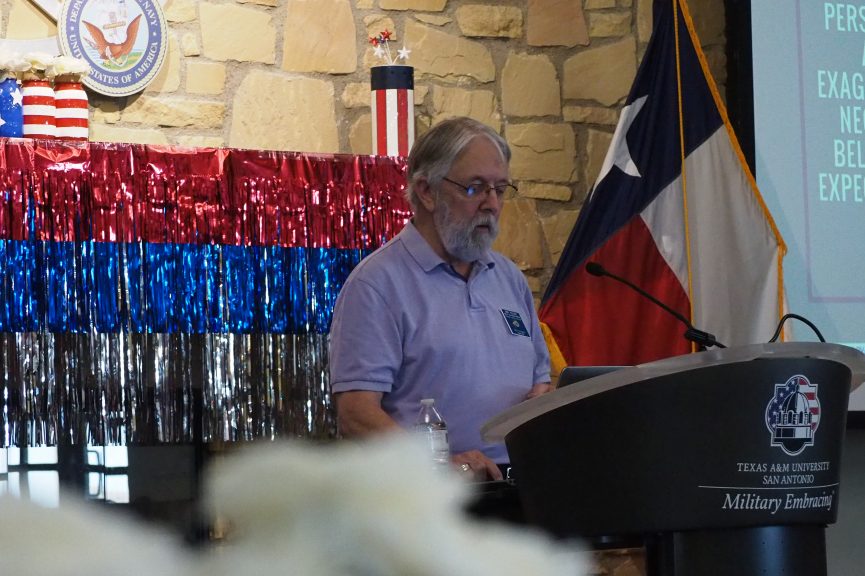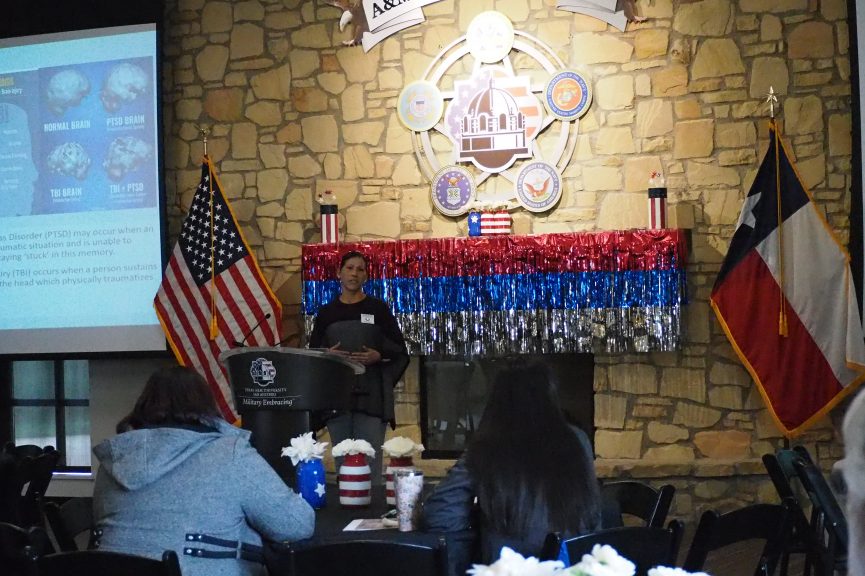Post-traumatic stress disorder isn’t the only thing veterans deal with; some experience a phenomenon called moral injury, a Texas Veterans Commission representative said at a lecture earlier this month at Texas A&M University-San Antonio.
Invisible Wounds of War-PTS, TBI, Moral Injury, and Suicide was held Nov. 13 in Patriots’ Casa. Lt. Col. John Wilson, a retired Air Force veteran, and Yocasta Reynoso, a former active-duty sergeant in the Army, both spoke to the audience. The Office of Texas Veterans Commission and The Office of Military Affairs hosted the event.
Moral injury is different from PTSD, said Wilson. Moral injury refers to persistent, distorted and exaggerated thoughts or negative beliefs that occur when people feel they have violated their personal morals.
“They feel instances of harm or that they’re evil and they feel guilty,” Wilson said. “They can feel rage as well because they feel someone or themselves has crossed a line, feel as if they are a disgrace and disgust in themselves.”
Returning veterans can experience mental illnesses that take a toll on how they view their self-worth, the speakers said.
Traumatic experiences and readapting to a civilian lifestyle can raise a variety of mental illnesses that may lead to suicide.
Wilson said many events can happen in or out of the field that can cause moral injury or PTSD.
The symptoms of PTSD include startle reflex, memory loss, flashbacks and fear, which develop because of a traumatic event.
PTSD is not limited only to veterans who have been in combat. Being in a military environment can be enough to traumatize veterans.
“I was stationed in Fort Polk, Louisiana, and we went to a military position during (Hurricane) Katrina,” Reynoso said. “The things that we saw there were too traumatic for some of us.”
Wilson said individuals with PTSD show signs of self-harm intentions by isolating themselves, giving away cherished items or purchasing weapons for the first time. This would be where someone else intervenes.
“That’s the time when you talk to them and you say something real specific like, ‘Are you thinking about killing yourself?’ You ask that particular question that hard, that bold, you ask,” Wilson said.
Leaving the military and going back to a civilian lifestyle can be a difficult transition. Veterans grow accustomed to taking many types of responsibilities. A big factor in those responsibilities is doing what’s best for the greater good.
“We want to have that continuous sense of giving back, giving to their nation who honor us to give us that opportunity to serve our nation. We want to give back more,” Wilson said.
Veterans also want to feel a sense of camaraderie, according to “Veteran Suicide, A White Paper Report,” published July 12, 2018, by The American Legion.
The report, which was available at the event, found that veterans often consider their previous military units to be family.
“The loss of trusting relationships and a social support system can reduce the way a veteran manages intimate relationship stressors, financial instability and may lead to substance abuse or legal issues,” the report said.
According to a survey done by Pew Research in 2011, “Nearly a third (32%) of all veterans say they had a military-related experience while serving that they found to be “emotionally traumatic or distressing” — a proportion that increases to 43% among those who served since the Sept. 11, 2001, terrorist attacks.”
Reynoso explained anyone can step in and help by asking questions of someone who is potentially suicidal or depressed. However, there are questions that can be considered offensive so it’s vital to educate oneself about what questions could trigger a veteran.
Reynoso said people should avoid asking questions such as, “Did you kill anybody while you were deployed?”
She said PTSD and depression are often intertwined.
“Depression is shown to be three to five times more likely with those that have PTSD, according to the VA,” Reynoso said.
To seek help with PTSD or moral injury, Wilson and Reynoso recommend going through these sources: that shows many searchable databases that can help them find the help they need.
- TexVet.org
- Va.gov








